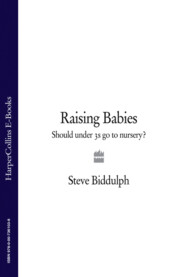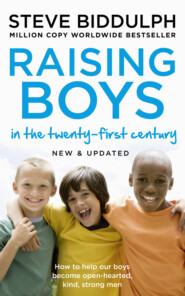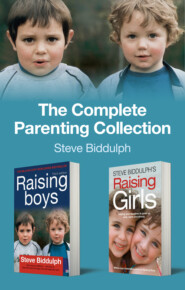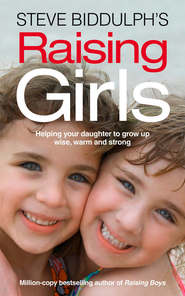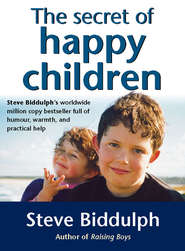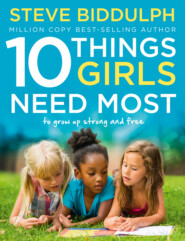По всем вопросам обращайтесь на: info@litportal.ru
(©) 2003-2024.
✖
The Secret of Happy Parents: How to Stay in Love as a Couple and True to Yourself
Автор
Год написания книги
2019
Настройки чтения
Размер шрифта
Высота строк
Поля
The chapter on sex and romance is deliberately placed after that about children – these two ingredients often come easily in courtship, but with a house full of kids they require deliberate cultivation!
And finally …
10. Advanced lessons: how every event in your life – even the disasters – can open you up to a deeper and more fulfilled life.
THE TWO BATTLES OF MODERN LIFE
The battle for childhood
Today a big battle is raging, perhaps the most important struggle of our time. On one side are economic rationalists, including many in departments of Early Childhood at universities, who believe childhood can be professionalized, streamlined and mass-produced to fit the modern world. On the other side, there are those of us who think that love cannot be bought, or hurried, or squeezed into ‘quality time’, but must be hard won, eyeball to eyeball, skin to skin, between every parent and every child, over years and years of loving and learning.
The battle is for a loving, timeless, individualized and whole childhood. The danger is that kids become lost in our materialist quest, caught in our competitive madness, homogenized into crèche-raised, insecure yuppie rugrats; the shopping centre fodder of an impersonal and conformist world where you are measured by your designer labels, and love, commitment and sacrifice are forgotten.
The debate about putting young babies into long daycare is an obvious aspect of this, as is the battle for parents – including fathers – to be given family-friendly working hours. Corporations – not governments – run the world now, and ‘love’, ‘community’ and ‘family’ are not often in their vocabulary.
Young parents haven’t got the time to BE parents – caught up in a roundabout of earn-and-spend. In the Third World it is even worse: workers sleep at the factory; children become prostitutes to save their families from eviction from their land.
We have to link up our energies and give each other encouragement and ideas. Parent power is gradually rising, with the realization that we have to fight for the right to parent our children and for a society that puts people before profits, community before convenience. It’s a battle that starts at home, with the decisions we make, but that is linked to the destiny of the whole human race.
The battle for marriage
There’s another battle raging too: the battle to save relationships. Over 40 per cent of marriages end in divorce. Our belief from counselling hundreds of couples is that around 70 per cent of these marriage break-ups are preventable. That is, they are caused by people panicking; not having the skills, the support, or sometimes the maturity, to push on through a layer of difficulty which, if it had been faced, would have led to considerable growth. It has been found that people once separated, usually re-partner, then encounter the very same difficulties four or five years down the track – plus all the stresses left over from the first marriage: access, support, and so on. The idea that ‘If I could just find the right partner everything would be wonderful’, while certainly good to pursue as an ideal, is often flawed because it’s the same us that we take wherever we go!
Separated people frequently admit – in the privacy of the counselling room – ‘If I knew what I know now, I would have stayed and worked on my marriage’. While there are partners whom are worth leaving: intractably violent, patently untrustworthy, abusive or addicted; the great majority of us marry people with hang-ups very similar to our own, and from whom we could learn a great deal if we were to persist. This doesn’t mean putting up with what you don’t like, but learning how to negotiate change.
Whoever you are partnered with, it’s still the same task. To thrive in love means learning some skills – which this book will help you with. It means putting a priority on having healthy relationships. This means not getting caught up in the pressure of an insane society – the rush to earn and spend – but realizing that time is the most precious commodity in life and investing it in ways that will maximize the love in your life. This might actually mean increasing your own reflective time (sometimes the best thing you can do for your marriage or your family is take a long walk in the countryside – by yourself). And of course increasing the time you spend with each other, to give love the chance to grow.
Time is the central issue of modern life. We no longer walk down grassy lanes to visit our friends, or work in the fields with lots of time to think, so we have to deliberately set aside soul time: time for peaceful reflection; the opportunities for deep and wandering conversations which were once an everyday part of human life. The enemy of love in the modern world is not hate, but hurry. The good news is that whenever we invest time and effort between any two human beings, parent and child, friend and friend, then love will grow.
So these two battles – for more loving lives for children; and more committed, resilient and erotically charged relationships between men and women – are entwined. Our kids don’t need us to stay stuck in bad marriages or to leave our difficult marriages behind but to get in and sort out our problems so they can see their parents in a living, yet secure and strengthening union. We owe this stability to ourselves and to them.
To assert the importance of love and people is to hold a bright flaming sword up in the snarling face of economic rationalism, the cancerous culture of get-and-spend. More and more people are doing this. More and more people are choosing love as the central principle of their life. It is important to make this choice and let it be the heart of every action.
2 Compatibility: The Ways We Connect (#ulink_a0ef8014-d2d2-56e2-9c96-0f9fd0a1cc90)
Three Kinds of Attraction: Liking, Loving and Lust
The family cycle begins, naturally enough, with ‘boy meets girl’. It’s the attraction of opposites that sparks the explosion that kicks along the whole wheel of life. But attraction is a complicated thing. It has many levels to it, and understanding these levels is vital to a happy love life.
Not everyone gets together in the same way. For instance, some couples are first attracted at the mind level – liking the other person’s ideas, finding him or her funny, interesting, stimulating. Other couples may find that they connect initially from the heart level; that warm affection and loving feelings arise easily between them. And of course many couples begin with an obvious sexual attraction, that tantalizing tingling excitement that is pure lust! To complicate it more, the way you feel about the other person is not always mirror-reflected – you can lust after someone who only likes you, or love someone who is only capable of lust, and so on. It can be tricky, especially when you are young and inexperienced (or, for that matter, old and stupid).
Levels of attraction are especially important to be aware of in the early stages of finding and choosing a partner. It’s important, especially for teenagers, to distinguish these three levels of need and, in handling personal relationships, to be honest with yourself about which is what. Knowing yourself well enough to tell love from lust, liking from loving, is the real sex education and can help avoid countless problems.
It’s tough being young, and some lessons can only be learned by experience. Remember in your youth, finally getting up the courage to declare your love to the girl (or boy) of your dreams? Having had some friendliness from them in the past, there seems every reason to hope … and so you finally take the plunge and pour out your heart! To your horror, they look alarmed and utter those fateful words: ‘Oh no … oh wow … look … I really like you, but …’ It’s lucky that hope springs eternal, or we’d all be celibate!
Whatever kind of attraction you start with, a developing couple partnership will usually grow to involve all three. When liking, loving and lusting are present in symphony, then the effect is unforgettable. Since this often happens more by accident in the early years, you will sometimes be left gasping, wondering what you did right! As you get older, you will have to be your own fairy godmother. You will learn more about how to achieve the sustained and deeper communication, so that your love isn’t a lucky accident, but an achievement, a deepening well of experiences shared and lessons learned, that you can draw on at any time.
Now let’s explore how the three levels of attraction work, and then what to do when they stop working. Even if you’ve been married for fifty years, you’ll enjoy reading this part, to reminisce and understand the journey you have already made. If you’re a little younger than that, it might even help you to power your love-life along!
Liking: a meeting of minds
Liking is the safest, easiest kind of human attraction. You can like all kinds and all ages and sexes of people – you can even like people you don’t approve of, or would never buy a used car from. Often you will like some things about a person, and dislike other parts of them. (If you like everything about someone, stick around; something you won’t like is bound to show up.)
As you get more involved with a person, either as a friend or as a lover, then you might ask them to change behaviour you don’t like. Relationships involve changing ourselves all the time. It’s no big deal: if you are giving your lover a back rub, you might do it vigorously, because that’s what you enjoy. They explain they like a gentler massage, and so you change. If you live together, you might like to make the kitchen spotlessly clean and tidy after every meal. They might prefer to leave the dishes for a big once-a-week cleanup. Committed partners sometimes make big requests of their partner: to give up drinking or smoking or living a life of crime, for instance! Our partners may change, or they may not. We are all aiming to get more of what we like, and less of what we don’t.
A trap with liking, especially when we are starting out in a relationship, is that we will tend to like people just because they like us. Especially if we are inexperienced or, let’s face it, a bit desperate. In fact, it might be their liking us that is the main attraction. If their enthusiasm for our wonderful qualities fades, as well it might, then we might discover we do not like them after all.
In courtship and dating behaviour there is usually a huge amount of talking going on, hours on the phone and late into the night. But it isn’t just small talk; it carries all kinds of hidden meanings. ‘Do they like me?’ ‘Do they want to know me better?’ ‘She yawned – what did she mean by that?’ It’s a beautiful if rather anxious time, and one which we will remember all our life. Spoken words seem to acquire a powerful magic.
The jokes, repartee, questions and proclamations of what we believe in and what we like and dislike, are part of a natural screening process. We are ‘interviewing’ for the job of lifetime lover. It’s important to find out if this person, who looks great on the surface, is really a horrible psychopath, or hopelessly screwed up, or is exactly your kind of person!
What to look for
What human beings like in another person is pretty universal. Are they kind – to us, and to other people? (How do they treat their mother?) Are they funny – not the try-hard, jokester kind of funny, but good humoured about life, including its difficulties. (Why do the singles columns always have SOH – sense of humour – along with ‘likes romantic walks, candlelight dinners’, etc. Do they really mean: ‘Has to be able to put up with me being a drunk, losing the family car in a card game?’ You can just imagine the conversation six months down the track: ‘ So I burnt the house down – where’s your Sense Of Humour?’ While we’re on the subject, why do the singles ads never say ‘Good at washing up’ or ‘Excellent with crying babies’? And how about those that say ‘Children not a problem’? Who are they kidding? But we digress.)
Are they realistic, clear-headed, practical? These are likeable qualities, and very valuable in a partner-to-be. Do they have beliefs and values that you admire, and are they doing something more than just spouting words about these things ?
There are other qualities we like too, of course, that are not quite so deep. Lots of people marry or move in with someone because they like their hair, or those cute dimples, or that heaving bosom, or their country music collection. Good luck to them.
A note of caution. Our hormones can be our worst enemy at this stage. From the mid-teens on, nature wants us in love and breeding fast, so a certain amount of applying the brakes is needed. You make the best choices when you are not in such a hurry. That’s why it’s a good idea at any age to fill up your need to like and be liked with friendships of many kinds, before you get into the tangle of involving yourself in a couple. Loneliness blurs your judgement – believe it.
Loving: the heart connection
Liking usually comes first, but loving can soon follow, and everyone over the age of ten knows that this is a different and more powerful emotion. It’s the feeling that says ‘special’. Limited edition. Limit one per customer.
Love requires a certain kind of openness and trust, a willingness to be vulnerable. Listen in on this conversation between a couple in their thirties, just beginning a relationship, and tentatively beginning to risk being open:
Notice how misunderstanding and hurt can easily arise. Yet only by being honest by saying those risky things like ‘I wanted to call’ and ‘I thought you knew how much I felt for you’ can we allow love to grow.
Loving is complex because it carries the baggage and expectations from earlier love experiences, including those from childhood. In men this might include feelings about mothers who were or were not there for us. In women it will tap into memories of fathers who were kind, or mean, attentive, or absent. You might feel a strong attraction to someone who is actually a bastard, because bastards were the people who loved you when you were a child. (More of this later, we’re trying to stay positive here.)
Also strength of love does not always mean the same as depth. You can fall passionately in love with the idea of a person, when they are actually quite different. Tricky.
Love can be expressed in words, but it is not about words. The human heart aches, it sings and it soars, but it doesn’t talk much! Loving actually causes alarm in some people because it is part of a domain that is unfamiliar – the domain of emotion. Don’t panic – feelings are simple!
With increasing honesty as you voice your feelings, a couple can begin to understand and clear up the obstacles to closeness one by one. Love grows through the vulnerability you show, as well as the strength of feelings you admit to. Your real self comes out more and more – and guess what? They still like you! You begin to feel that you can say anything, discuss anything, be completely yourself. It’s a great feeling. (Though there’s always something new, dark and murky arising from deep down, to make you start all over again.)
The good news is that love between two people may take decades to reach its fullest peak, so you have plenty to look forward to.
So in a growing relationship, men and women find attraction growing from head to head, and also from heart to heart. But there’s another level too, so let’s rock on down to the basement.
Lust: The fire down below
Sexual attraction is a lifelong, powerful tide which either adds energy and magnetism to relationships, or constantly blasts us apart, depending on our skill and awareness in navigating it. You will often hear sex denigrated as the ‘animal’ part of our make-up, a Stone Age leftover which disturbs our rational mind. In fact human beings are more dedicatedly and enduringly sexual than any other animal species. (With the possible exception of pygmy chimpanzees, who make us look positively inhibited. But this is a family book, so we won’t go into detail.)
In human beings, the original purpose of the sex drive – to motivate reproduction – has been partly diverted to serve an equally important role, that of social connection. Although sex often seems to be a disrupting influence on our social fabric, it is nonetheless the force that creates and holds families and therefore communities together. Obligation and duty wear thin very quickly; they are recent and advanced concepts in evolution: nature counts on much stronger glues to cement us. Our biology has ensured that we will not rely on abstract ideas of loyalty and love, but that commitment will be deeply felt, that these feelings will give us more pleasure and reward than any other path in the long run. Therefore sex, love, communication and long-term bonding are all deeply intertwined in human beings. We make love with our brains, which is why sex is so special and important – and difficult.
Sex and bonding






